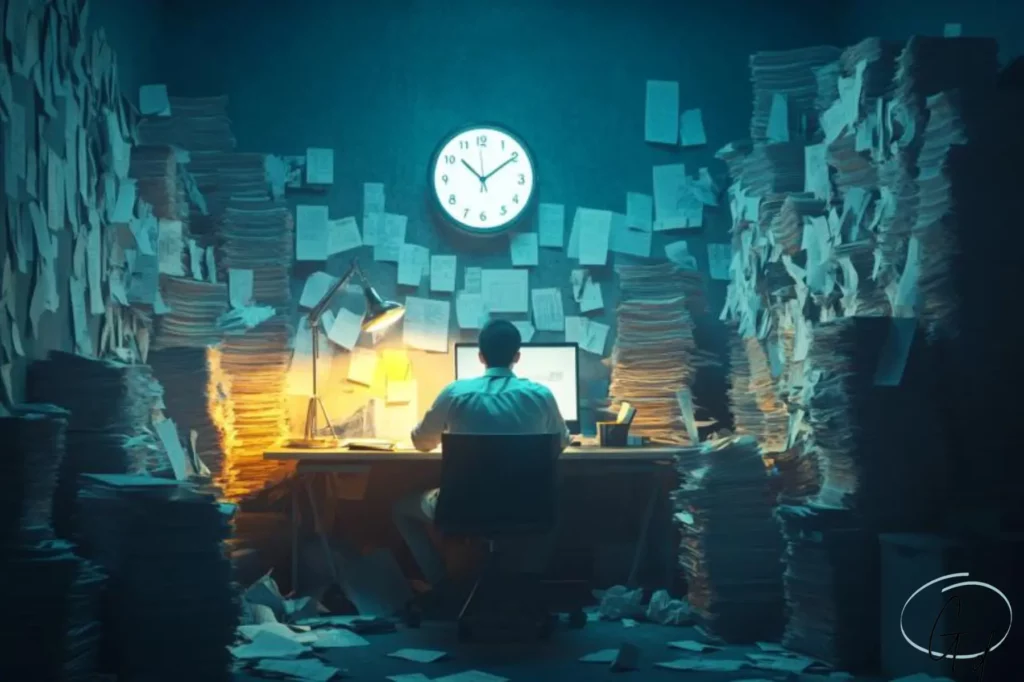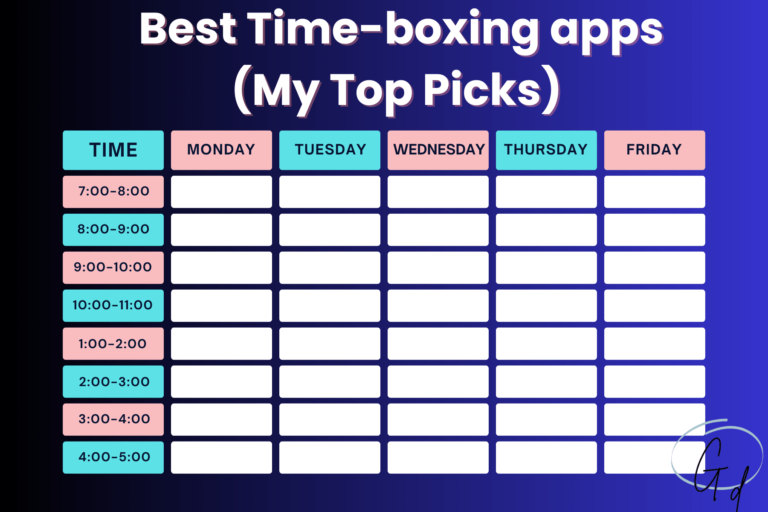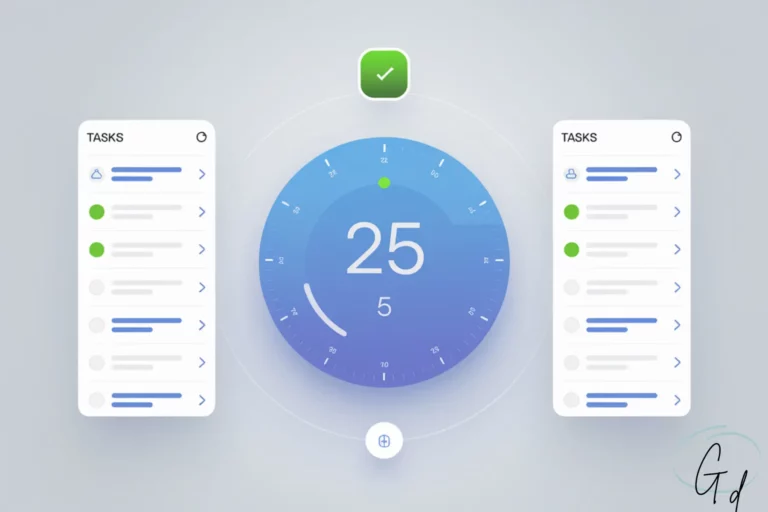12 Biggest Time Wasters at Work And How to Avoid Them
Do you know what is one of the main reasons you are not as productive at work as you would like to be?
Time wasters.
The average worker wastes 60 hours every month due to workplace distractions, with over 79% of workers feeling distracted during a workday.
That’s why staying focused is so important.
If you’re tired of this situation, this article is for you.
I’m gonna show you what are the biggest time-wasters and how to avoid them so you can get your work done.
Trust me; you’ll be surprised to realize how many ways to waste time are there and why it is so important to say “no” to these distractions.
It’s time to change your habits and take back control of your time!
Key Takeaways
- Identifying and reducing the common workplace time wasters is essential to maximizing efficiency in the workplace.
- Setting boundaries for what an employee will and won’t do can help manage unreasonable colleague expectations without offending them.
- Establishing clear rules about expectations helps establish a trust-based management strategy that enables efficient processes while freeing employees to engage in more meaningful goals like customer service or innovative solutions that drive success.
12 Common Time Wasters Examples at Work
Oh man, let me tell you about the time I finally got real with myself about how much time I was burning through at work.
It’s like one day, you’re on top of your game, and the next, you realize half your day is gone with nothing to show for it.
Been there? You might think it’s just you but trust me, it’s a common struggle in workplaces everywhere.
Interruptions, meetings without agendas, phone distractions, and social media can all interfere with an organization’s productivity.
Let’s take a look at the most common time-wasting activities and how to avoid them.
Procrastination

One of the negative effects of procrastination is that getting things done is almost impossible.
Visualize this scenario: It’s a Monday morning, and your task list is waiting for your attention.
Instead of starting on it, you think, “Well, I have time,” and suddenly, scrolling through social media feeds becomes the first order of the day.
That’s how procrastination can ruin your life.
Such activities steal valuable productive time away from essential tasks that need to be done during the workday.
Procrastination lowers your productivity levels and makes reaching your goals almost impossible. That’s why it’s crucial to start working on your laziness and procrastination as soon as possible.
The solution
First of all, you must understand the reasons why you procrastinate and implement strategies for overcoming them.
Then, consider using anti-procrastination apps to escape from this vicious cycle. They’ve been a game-changer for my career and productivity, especially if you realize you’re procrastinating too much.
Checking emails

Checking emails seems quick, but it adds up. People waste hours daily managing their inboxes.
I learned this the hard way, feeling busy but unproductive.
Statistics show we usually spend excessive time checking emails.
I mean, it’s not the end of the world if you don’t read a new email immediately.
The solution
My solution? Check email only three times a day: morning, midday, and before quitting. You can also set a specific time for doing it but don’t exaggerate.
Trust me, this works. I’m more productive, and my colleagues are asking for advice.
Interruptions
You’re in the middle of conquering your to-do list, riding high on effectiveness, then bam! Another interruption.
Does it resonate? For most of us striving in the work environment, it’s a prevalent narrative.
According to a survey, the average worker was interrupted or switched tasks every 11 minutes.
The real stinger? Getting our minds back on track post-disruption takes over 25 minutes.
That’s why it is essential to learn how to manage interruptions at work.
Being bombarded with emails, phone calls, chimes, pings, and alerts throughout the day makes it nearly impossible for us not to become distracted and leads us further away from our main task at hand.
The solution
Implement time boxing and focused work sessions.
Avoid scheduling meetings or checking emails during these periods. Minimize noise, visual clutter, and digital distractions. Use tools or apps to block websites and notifications.
Unnecessary meetings

How many times have you opened your calendar and remembered that you have a meeting coming up soon?
Unfortunately, most of them are really useless. As an account manager, I try to limit them as much as possible.
A survey by RescueTime found that around one in three employees consider their attendance at certain meetings to be completely redundant and a time-waster.
The time you spend in needless meetings is time you’re never recovering, resulting in wasted work hours and decreased productivity.
This often leads to costly lost billable hours, decreased employee morale, and delayed project timelines.
The solution
To minimize the waste of time in unproductive meetings, you should use tools like Motion AI to organize your day and improve your organizational system.
Additionally, it’s important only to include necessary participants who can provide value and offer meaningful contributions.
A strategy I often use is to set a maximum time limit in meetings so that I do not spend too much time there and distract my colleagues too much.
Repetitive tasks
Repetitive tasks are one of the most common workplace time-wasters, draining focus and costing businesses valuable time.
Some examples of these repetitive tasks? Manual data entry, managing customer information, or analyzing data manually.
Identifying these types of time-wasting assignments early on is essential, as they add little value to workflow and typically resist attempts to automate them with technology.
By automating simple yet repetitive actions where possible, you can decrease employee strain while being effective with your time.
The solution
We’re living in an age of artificial intelligence. Why do things the hard way?
Tools like ChatGPT and Gemini can handle boring tasks like analyzing data and writing reports.
Sure, they’re not perfect, but they can save you time and energy.
Micromanaging

Micromanaging really has a way of sucking the energy right out of your workspace.
I’ve seen it firsthand in my previous job, and let me tell you, it was a nightmare to watch trust and autonomy fly out the window.
Employees need room to breathe, innovate, and own their tasks. It’s like when someone is hovering over your shoulder while you’re trying to concentrate. Stressful, right?
I’ve worked in several companies with this approach, and I can assure you that it destroys workplace productivity and leaves you feeling stressed and dissatisfied.
Not to mention that micromanaging often results in unnecessary repetition of tasks or processes that waste a lot of time at work, as we’ve seen before.
The solution
Trust your team, set clear roles without being overbearing, and learn how to delegate effectively.
They must learn how to take responsibility for their actions.
Multitasking
Oh, multitasking – the sneaky time thief in disguise. You feel like a mighty warrior, juggling multiple tasks at once.
Yet, here’s the kicker: every switch between tasks costs you precious minutes.
I improved my productivity and focus a lot by focusing on one task at a time.
Taking on too many activities at the same time is the best way to transform your clear agenda into a complete mess.
The solution
Determine the most important task and tackle it first.
Resist the urge to work on multiple tasks simultaneously
Social media and online distractions

Social media and online distractions are a real rabbit hole at work, aren’t they?
One minute, you’re scrolling for “just a sec” to catch up on messages, and the next thing you know, half an hour has gone by, poof.
The solution
If you want to avoid wasting time on this common time-waster, I have a secret weapon for you: focus apps.
These tools are lifesavers if you’re serious about yanking productivity back from the jaws of Instagram or YouTube during crunch time at work.
They’re apps to block distracting websites and lock you into your workflow zone.
Untidy workspace
A cluttered desk and overflowing inbox can be productivity killers. Imagine wasting hours hunting down a lost file only to find it buried in a forgotten folder.
This happened to me, and it was a disaster. You can try to focus in such an environment, but it’s almost impossible.
Regularly organizing your physical and digital workspace is essential.
The solution
Spend 15 minutes tidying up at the end of each day. You’ll thank yourself later. A clear space equals a clear mind, boosting your work productivity and teamwork.
Staying organized saves time, reduces stress, and improves your overall work performance.
They’re apps to block distracting websites and lock you into your workflow zone.
Chatty coworkers

Whether you work in a big multinational company or in a small office, you’ll always find a chatty coworker who loves wasting time during the day.
When you’re in the middle of a project and suddenly faced with conversations that can pull your attention away from your task, it’s easy to slip unintentionally into time-wasting activities.
In fact, researchers suggest that innocent interruptions from colleagues can result in a loss of up to five hours per week when not appropriately addressed!
Balancing social interactions with the need for focused work is essential to avoid getting drawn into the conversation treadmill as a time-waster.
The solution
Politely and assertively express your need for focused work time to colleagues.
Use headphones, noise-canceling devices, or a closed office door to signal that you’re unavailable.
Perfectionism
Perfectionism in the workplace can be really dangerous.
Since I’m a perfectionist procrastinator, I know what I’m talking about.
You think you’re doing your best work, but instead, you’re sinking hours into dotting every “i” and crossing every “t,” when really, hitting a home run doesn’t always mean getting everything perfect.
If you’re taking on too much time to finish a task, you’re probably overthinking. It’s not about delivering poor work, but it’s about try setting a specific time for each activity.
The solution
Set time limits for tasks and focus on good enough rather than perfect.
Use time-boxing apps to manage your time better.
Aim for high quality but accept that perfect is often unattainable or unnecessary.
Lack of organization
If you want to be productive at work, you must be organized.
It prevents stress and boosts productivity. I learned this the hard way after missing a deadline due to lost notes.
Using focus apps is an excellent way to reduce time wasters, but you must also organize your days.
In this case, an accountability calendar can be a game-changer for you.
How to Avoid Time Wasters
If you want to waste less time and reach your goals faster, you need to change your habits.
Here are some tips that I put into practice every day and that allow me to save time to dedicate to important activities.
Stay focused and avoid distractions

Our attention spans are shrinking thanks to constant distractions.
Checking social media and emails all the time zaps leads to wasted time and increases procrastination.
It may seem harmless to check that notification or take a break with that coworker who loves talking for hours, but it’s not.
Focus is key to productivity.
To fight distractions, try using focus apps to block websites and stay on track. Also, make sure to set specific times for breaks throughout the day.
By cutting distractions, you’ll feel more focused and achieve your goals faster.
Set clear boundaries and learn how to say ” no”
Setting boundaries means establishing limits on what you will and won’t accept in the workplace.
It’s like creating a personal fence around yourself to protect your physical, emotional, and mental well-being.
Learning how to confidently say “no” is an essential skill for anyone who wishes to increase their productivity and quality of work.
I learned this the hard way by taking on too many projects at once. It’s important to set boundaries to avoid burnout.
Improve your time management skills

You can avoid most of the time wasters in the workplace by learning how to manage your time effectively.
Ever tried time boxing? It’s basically telling your tasks when they get to see the light of day instead of letting them boss you around.
Time-boxing apps are a great way to start managing your time effectively.
You’ll be able to set a specific time for each task, so you’re not just about investing too much time on it.
For example, I dedicate 30 minutes each day to checking my email. Once the time is up, I move on to the next task.
Suggested reading: differences between time-boxing and time-blocking.
Learn to say ” no”
Learning how to confidently say “no” is an essential skill for anyone who wishes to become a high-achiever.
Taking on too many projects or duties can consume a lot of time and put you in the position of being unable to meet deadlines while attempting excessive multitasking.
Saying “no” allows you to establish limits that better reflect your working hours or capabilities, allowing you to produce higher-quality results without feeling overwhelmed by unnecessary stress.
I suggest you talk to your boss if you’re overwhelmed. Remember, it’s okay to say “no” to protect your time and sanity.
Whether you work from home or in an office, saying “no” is a crucial skill you need to learn to increase your productivity.
What’s the Impact of Time Wasters?
Eliminate time wasters is crucial for your productivity.
Here are the real costs of time-wasters in the workplace.
Lost billable hours
When workers lose time that could otherwise be used towards tasks or projects, financial costs develop in missed opportunities for work and business operations.
A study by CIO Insight found that businesses waste about $1.8 trillion annually on repetitive tasks.
This is partly due to the difficulty in finding valuable ways to spend time at work, such as studying industry trends or cultivating relationships with clients and partners.
And if you are a freelancer, you should know that you are losing precious money doing useless activities that harm your productivity!
Decreased productivity
When you keep getting distracted, it’s difficult to stay focused and productive.
And obviously, this also affects your performance, but also your mood, and your self-esteem.
This is why it is important to be disciplined and work hard to stop constantly distracting yourself.
Delayed projects
Time wasters cost time (obviously), but that means you risk being late with your deadlines, especially when you’re in a pinch.
All of this leads to less trust from your team, more stress and anxiety, and lower self-esteem.
And obviously, this will lead you to procrastinate more and more, focusing on useless activities rather than completing your tasks.
Conclusion
It’s time to stop wasting time.
Small distractions can add up to lost hours.
To boost your productivity, identify what’s stealing your time and cut it out.
My secret is combining time-boxing apps with focus apps to increase my concentration and efficiency.
Managing your time is not something you learn overnight, but it’s essential to create a work routine and organize your day better.
Don’t let small-time wasters at work turn into huge productivity killers.
Take control now and watch your work life improve.

About Author
Giovanni is a maestro of time management, motivation, and accountability.
With an experience of over seven years as an account manager, during the night, he transforms into an SEO consultant, one of his many passions.
In this blog, he shares his best tips on becoming the best version of yourself based on his experience. Learn more







